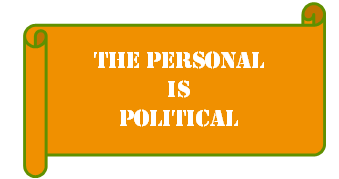Micaela Serra
My Favourite |
If you are interested in the meaning of "Personal is Political" and its origin, read the comments below. Or go straight to the original paper by Carol Hanisch.
Your beliefs become your thoughts. Your thoughts become your words. Your words become your actions. Your actions become your habits. Your habits become your values. Your values become your destiny. Mahatma Gandhi
Symptoms of Inner Peace
-
An unmistakable ability to enjoy each moment.
-
A loss of interest in judging other people.
-
A loss of interest in judging the self.
-
A loss of interest in interpreting the actions of others.
-
A loss of interest in conflict.
-
A lack of ability to worry (this is a very serious symptom).
-
Frequent, overwhelming episodes of appreciation.
-
Frequent feelings of connectedness with others and with nature.
-
Frequent attacks of smiling.
-
An increasing tendency to let things happen, rather than making them happen.
-
A tendency to act and think spontaneously rather then on fears based on past experience.
- An increased susceptibility to the love extended by others as well as the uncontrollable urge to extend it.
The personal is Political - What does it mean? (from the F Word)
During the ‘second-wave’ of feminism in the 1960’s-70’s, the idea developed that ‘the personal is political’: i.e. that every part of our personal lives could be affected by the political situation.
-
The personal is still political. The millennial feminist has to be aware that oppression exerts itself in and through her most intimate relationships, beginning with the most intimate, her relationship with her body. [Germaine Greer, The Whole Woman]
-
The new feminism must unpick the tight link that feminism in the seventies made between our personal and political lives… identifying the personal and the political in too absolute and unyeilding a way has led feminism to a dead end… If you seperate out the personal and the political you achieve two things. First, you give the social and poltical demands of feminism more edge. Freed from the straightjacket of political correctness, feminists can embrace any strategy that will help to achieve the goal of material equality for women… second, you will free up the personal realm. Feminism has over-determined our private lives and interpreted too many aspects of our cultural life as evidence of a simplistic battle, patriarchy verses women… personal life does not always march to a political drumbeat. [Natasha Walter, The New Feminism]
-
The personal as the political was never meant to be a prescription of how to live your life. It was never meant to be a rallying cry to shave off your hair and take up with the lady next door. But what it was really meant to do was create an awareness of how our personal lives are ruled by political forces. Of how the fact that women were not economically or politically equal to men meant that their relationships were unequal too… Why are we terrified of the personal being political? Is it that we’re so fearful of being called humourless that we don’t accept the truth?… To accept that the personal is still political is to be realistic. It is not to say that political changes - equal pay, childcare, welfare support for single mothers - are not important. They are particularly crucial… But the personal - body image, intimate relationships, women’s portrayal in the media - cannot be ignored… It is easy to agree with equal pay for equal work. It is perhaps more difficult to open up to troubling truths about our personal lives, and accept that our actions might have a political grounding. [Katherine Viner, in On the Move: Feminism for a new generation]
-
Sue: …it took me some time to acknowledge that ordinary daily events could be political. Audrey: …My marriage broke up in 1967… Predictably, I leaned heavily on a few women friends and we spent many, often happy enough, hours… wondering where it all went wrong. Why did marriages fail? Why didn’t we feel fulfilled by motherhood? We tried to analyse the problems… but we never made the links between politics and our individual feelings of disillusionment and discontent. Then an old friend and I attended a short course run by Juliet Mitchell on ‘The Role of Women in Society’… and we began to read people such as Betty Friedan, Hannah Gavron and Shulamith Firestone. Then the bells rang and the connections were made… I was no longer alone, but part of a movement which was primarily political but could be personal to me. Nan: …perhaps the single most important idea that emerged for me was that the way you live your life is a political statement. [Members of the Belsize Lane Women’s Liberation Workshop talking about their experiences: first published in Spare Rib 1978.]

